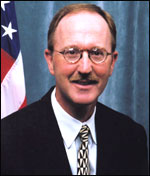
My, oh, Myers.
Photo: DOI.
Environmental advocates are bristling over President Bush’s nomination of William G. Myers III to the San Francisco-based U.S. 9th Circuit Court of Appeals, calling Myers the most anti-environment judicial candidate the president has ever put forward. With rhetoric like that being thrown about, don’t be surprised if Myers becomes the latest in a string of right-wing jurists stymied by Democratic filibusters in the Senate.
Myers, a spitfire critic of environmentalists, hails from Boise, Idaho. A longtime lawyer and lobbyist for the mining and cattle industries, he recently served as a Bush-appointed senior solicitor at the Department of Interior. Conservatives would love to see him seated on the bench at the 9th Circuit, which has a liberal reputation and reviews more high-profile environmental cases than any other federal appellate court.
But Myers faces a tough battle: More than 60 environmental, Native American, civil rights, labor, and women’s organizations have formed a united front to push for his defeat in the Senate. Many of their concerns were aired last Thursday when the Senate Judiciary Committee held a heated hearing on Myers’ nomination. Glenn Sugameli, senior legislative counsel for Earthjustice, said the committee took up “a fundamental question of American justice: Is a man who has advanced an absolutist ideological viewpoint throughout his entire career fit to be a federal judge?” (Sugameli has compiled info on the professional track records of Myers and other Bush judicial nominees on Earthjustice’s Judging the Environment webpage.)
Democrats on the Judiciary Committee, including Sens. Patrick Leahy (D-Vt.), Ted Kennedy (D-Mass.), and Dianne Feinstein (D-Calif.), roasted Myers for his explosive anti-environment diatribes over the past few years, in which he used the inflated cowboy rhetoric of Western landowners who consider themselves browbeaten by federal law.

By George!
In a public policy journal, Myers compared the government’s management of public lands to the “tyrannical actions of King George in levying taxes [against the American colonies] and turning even the simplest enterprises into exercises in bureaucratic and regulatory entanglement.” In a speech before a cattle industry association, he said, “The biggest disaster now facing ranchers is … a flood of regulations designed to turn the West into little more than a theme park.” At a legal conference, he slammed a federal rule protecting wetlands used by migratory birds as a “despotic intrusion by the federal government over every brook, creek, cattle tank, mud puddle, slough, or damp spot in every landowner’s backyard.” And he once blasted the Clinton-era rule that banned logging in roadless areas of national forests as “a narrow path toward economic and environmental destruction.”
Unafraid to attack the legitimacy of federal environmental protections at large, Myers penned a treatise entitled “Environmental Command and Control: The Snake in the Public Lands’ Grass,” decrying “the fallacious belief that centralized government can promote environmentalism” and calling environmental command-and-control regulation “outright, top-down coercion.”
When pressed during the Senate hearings to defend his pro-industry track record, Myers insisted that the positions he had taken in the past as a lobbyist and lawyer were not relevant and would not play a role in his decision-making as a judge. When Sen. Dick Durbin (D-Ill.) asked Myers, “Are you in the mainstream on environmental thinking?” Myers hesitated for a moment. “Yes, senator,” Myers said at last. “The only reason I pause is my statements have been on behalf of clients. These clients are in the mainstream, for the most part.”
Things heated up further when Democratic presidential candidate John Kerry (D-Mass.) jumped into the fray with a statement on Thursday demanding that the Bush administration revoke the Myers nomination. “Myers has devoted his career to favoring corporate special interests seeking to exploit public lands and sacred sites over the interests of ordinary Americans who want to preserve and protect our national heritage and great wild places,” said a release issued by Kerry’s campaign.
Officials at Interior hold a different view. “Bill has served this administration with professionalism, intellect, and grace,” intoned Interior Secretary Gale Norton in a farewell statement to Myers. “I have come to rely on his counsel and advice. He will be greatly missed. I wish him Godspeed in his confirmation process.”
In response to criticisms from environmental groups that Myers curried favor with the ranching industry while at Interior, agency spokesperson Mark Pfeifle told Muckraker, “The charges from these partisan special interests who are targeting Myers’ nomination are about as credible as Britney Spears saying ’til death do us part.'” The department’s inspector general has officially dismissed some charges against Myers of inappropriate activity during his tenure at Interior.
Still, it’s hard to deny the bias Myers has plainly stated in his own unbuttoned and impolitic writings and speeches — bias that hardly seems appropriate for a federal judge. “Don’t forget this is a lifetime appointment,” said Sugameli. “The longest legacy of an administration is its influence on lifetime federal judges. Myers is still in his 40s so he could be deciding the fate of major decisions on environmental protections for another 30 to 40 years. The senators get one chance to look at this. That’s why it’s so important that they do so with extreme caution.”
So far, leading Senate Democrats have been clear that they intend to take a hard look at the nominee. Sugameli hopes they will be no less willing to block Myers’ appointment than they were to wield the threat of a filibuster in recent months against other controversial, high-profile judicial nominees, such as Priscilla Owen and Miguel Estrada. The matter is expected to come before the full Senate before the end of the month.
According to Elliot Mincberg, vice president and legal director of the People for the American Way Foundation and a founding member of the Coalition for a Fair and Independent Judiciary, a filibuster might suit the Bush administration just fine. “There’s little chance Myers will make it through, and I think [presidential advisor] Karl Rove knows that,” he said. “This is more likely a symbolic political gesture. He’s using judicial nominations to make a statement to the right-wing base. Whether they win or lose, Rove can say, ‘Look, these are the kinds of people Bush wants to put in the courts.'” In other words, Mincberg argues, by championing a cowboy hero like Myers, Bush can lock in his Sagebrush Revolution constituency.
But the staunch right-wingers are seeing through the facade, too. In a San Francisco Chronicle op-ed entitled “Conservatives Wonder if Bush Is Their Guy,” Quin Hillyer, a columnist for the Mobile Register in Alabama, wrote, “Conservatives would be right to wonder if this president prefers to use filibustered nominees as a campaign issue [rather] than to actually put them on the bench.”


